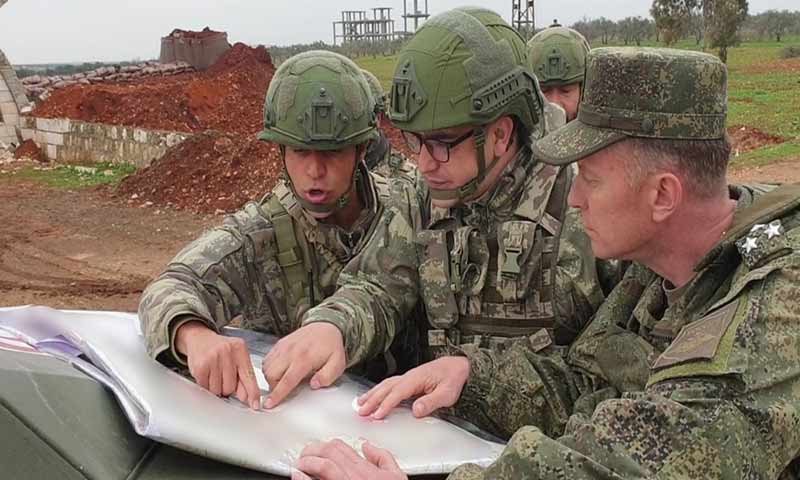



Russian-Turkish agreements govern most of the crises that cannot be solved militarily on the frontlines of intense fighting in Syria.
Since eastern and western Syrian north has become under the guardianship of Turkey and Russia, it shifted from being an epicenter of battles into somehow calm areas, sharing separation lines that are run by joint patrols between Russian and Turkish military forces.
The Syrian eastern and western north had been a scene for violent battles between Turkey-backed opposition factions on the one hand and the Russia-backed Kurdish People’s Protection Units (YPG), the Syrian regime forces, and the Iranian militias on the other hand. However, the two regions have transformed into relatively settled areas under agreements that were signed by Russia and Turkey.
This agreement began when Turkey found no listening ears to its demands to remove the Autonomous Administration affiliated YPG units existing on the Turkish border from the eastern Euphrates region to establish a safe area there.
Ankara has made several appeals to the EU countries and the US to stop their support through the International Coalition Forces (ICF) to the Autonomous Administration of northeastern Syria; nonetheless, Ankara’s calls were not answered.
In early October 2019, US President Donald Trump issued a decision to the US troops to withdraw from Syria. The YPG interpreted this decision as a green light for Turkish advancement. Ankara, on the other hand, did not think long after the US decision, and on the ninth of the same month, Turkish forces began marching towards eastern Euphrates regions.
Five days after the Turkish military operation which Ankara called the “Peace Spring,” Turkish Armed Forces (TAF) and the Syrian National Army (SNA) controlled over the cities of Tel Abyad and Ras al-Ain in the northern al-Raqqa countryside, and took control of tens of villages around the two cities.
The European Union and the United States of America released several statements disapproving Turkey’s Peace Spring operation; however, Turkey has continued its strikes against YPG units in order to advance further into the eastern Euphrates region. Furthermore, on 17 October 2019, the US stepped in and sent its Vice President Mike Pence to the Turkish President, Recep Tayyip Erdogan, to talk him into stopping the operation.
Pence and Erdogan agreed to pause the operation for 120-hours so that YPG units would withdraw from the safe zone on the Syrian-Turkish border.
Nevertheless, Turkey decided to resume its operation when the YPG Kurdish units did not withdraw from the safe zone. Ankara considered that Washington was buying time to replicate the scenario of the Manbij agreement. However, the final moments of the 120-hours of truce witnessed Russia’s intervention and shut down the operation altogether.
On 22 October 2019, and after lengthy discussions between the Russian and Turkish presidents, Turkey’s “Peace Spring” operation stopped, and both sides agreed on the complete withdrawal of all Kurdish units from the Syrian-Turkish border, 30 kilometers (18 miles) in depth within a deadline of 150 hours, as well as the withdraw of YPG weapons from Manbij and Tel Rifat areas.
The Russian-Turkish agreement allowed the Syrian regime forces to enter eastern Euphrates regions for the first time since 2012, after talks with the Syrian Democratic Forces (SDF) and in coincidence with the beginning of US withdrawal from Syria.
The Turkish and Russian sides also agreed on carrying out joint patrols ten kilometers (six miles) in-depth to the west and east of the “Peace Spring” operation area, except for Qamishli city.
The recent ceasefire agreement in northwestern Syria does not differ much from that conducted in the east for both are made by Russia and Turkey; however, the latest agreement came after a politically charged atmosphere between the two sides that evolved into a troop build-up in a show of force.
On 5 March, President Erdogan and his Russian counterpart Putin agreed on a ceasefire in Idlib province; the agreement was announced in a press conference between the two presidents after five-hour talks with the presence of senior officials of the two countries in Moscow.
The agreement stipulated an immediate ceasefire in Syria’s war-battered Idlib province on the demarcation line that was established within the “de-escalation” areas.
The agreement also helped into the creation of a “security corridor” 6km (four miles) north and 6 Km south from Idlib’s major M4 highway, which is connecting the Syrian regime-held cities of Lattakia and Aleppo.
The agreement called for further negotiations to mitigate the impact of the humanitarian crisis in the region and facilitate the return of the internally displaced persons (IDPs) to their homes
It also stated that joint Russian-Turkish patrols would start on 15 March along the (M4) international highway between Trinbeh area, west of Saraqib city, and Ain al-Hawr village in western rural Idlib.
The agreement was preceded by threats from President Erdogan to the Syrian regime forces to retreat behind the Turkish observation points and to withdraw from the areas it controlled in its latest offensives.
The agreement, however, helped the regime forces to maintain its positions rather than withdrawing, most prominent of these positions are the cities of Khan Shaykhun, Saraqib, Maarat al-Numan, northern rural Hama, and the western countryside of Aleppo.
if you think the article contain wrong information or you have additional details Send Correction